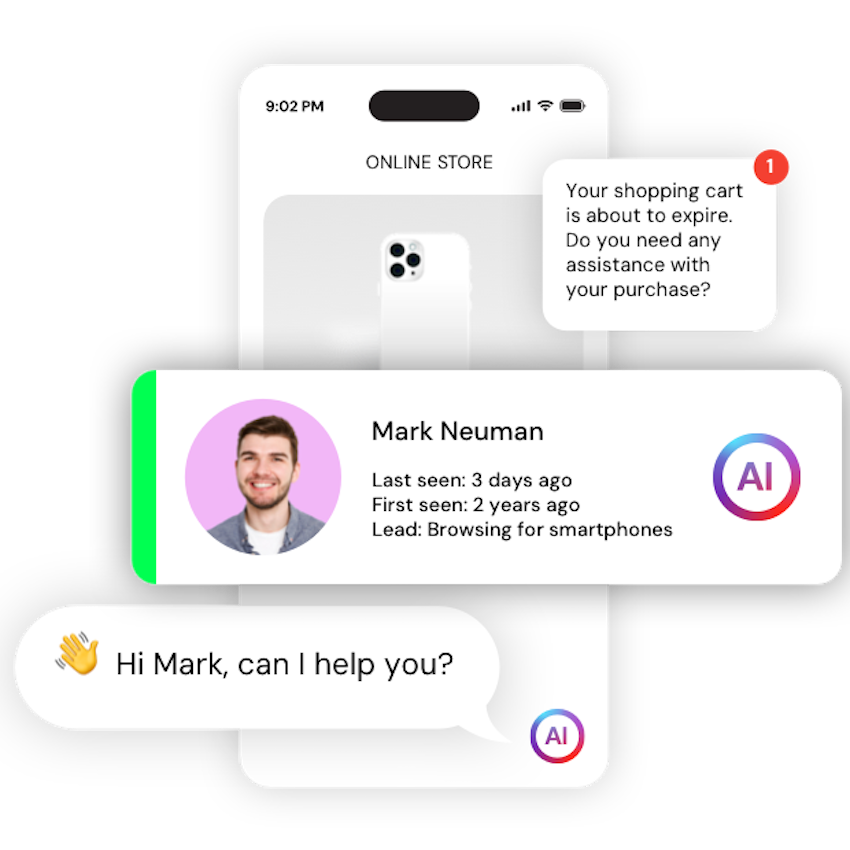Ben Mooney
As someone who partners with organizations around the world, I’ve decided to take that opportunity to talk to today’s top leaders about their experience with business transformation: How they’ve transformed their organizations and how they see the business priorities in their industries changing in the future. This is the idea behind this interview series, “The Business of Transformation.”
It was my great pleasure to have a chat last week with my friend Mark Power, co-author of the awesome new book Amazon for CMOs: How Brands Can Achieve Success in the New Amazon Economy. Mark is a 20+ year veteran of the digital marketing world with experience running his own digital agency as well as leading innovation for the Interpublic Group (IPG). He is currently the founder & CEO of Podean, a consulting group that provides a full spectrum of Amazon marketplace marketing services.
When I asked what business transformation means to him, he explained that it starts with having a marketing mentality. “In my mind, it’s keeping your business ahead of what’s happening within a market – or series of markets – then equipping it to be as forward-focused as possible. Because you have to continually adapt to new trends.”
But Mark notes that some industries have a harder time doing this. “The bigger an organization is, the harder it is for them to transform,” he notes, “particularly when they’re used to delivering certain things in an operational way based on legacy revenue.”
On the flip side, the most successful transformations he’s led have involved a radical approach: “We’ll challenge everything that [the brand] is currently doing to try to get their thinking to shift.” And this begins with senior marketing personnel, who can be more risk averse due to the pressure of turning big investments into growth.
“It’s important to transform your thinking. And your thinking needs to be: How do I do things differently? You’re not really marketing If you’re not differentiating.”
Clearly, transformation involves risk. But I was curious: How do you persuade CMOs to take big risks? What are the techniques involved in convincing executives that shifting from a cautious or conservative business strategy toward one that’s bolder is the right move?
Not surprisingly, Mark says it comes down to trust: “You have to take the sales hat off and become a consultative partner. You need to dig deep into what exactly those challenges are that a business may be facing. Once you get on top of that, they realize you’re listening.”
And once you build trust, Mark explains, you can help build the business case that the CEO or CFO expects. To do that, companies should aim for early quick wins based on the new strategy. “Just going in and selling a big idea – it’s never worked,” he says. “A better approach is ‘crawl, walk, run.’ Then the fun stuff kicks in.”
Speaking of the fun stuff, I wanted to ask Mark about his take on Amazon – particularly his concept of the “Amazon Economy.” What does he mean by that?
The answer, he says, begins with understanding what Amazon has built: not just a vast online marketplace, but an entire end-to-end customer experience. “It’s probably the most integrated company in history,” he explains. “The influence Amazon has over commerce and content is breathtaking. It’s made shopping easier, it’s made viewing easier, it has this incredible infrastructure, and it just knows so much about its customers.”
In this way, the company has transformed customer expectations because consumers now expect other brands to deliver as frictionless an experience as Amazon does.
And the smartest brands, the ones poised to successfully navigate business transformation, will do exactly that. As Mark says, “If we can all start thinking like Amazon, maybe we’ll learn how they do it – how they’ve become so sticky in our lives and so customer obsessed.”
Even though Amazon is 25 years old, Mark continues, it’s still coming into its own as an economic powerhouse with nearly unlimited potential for brands that can figure out a symbiotic strategy.
“You need to look at Amazon as a potential partner. How do you leverage its data? How do you leverage its infrastructure? How do you leverage its global reach? Because Amazon is here to stay.”
Which reminds me of one of my favorite lines from Mark’s book: “The only failing Amazon strategy is not to have a strategy.”
Because Amazon now plays a role in so many different markets, he explains, there is opportunity (or will be in the future) for smart brands that are serious about transformation. “As each year goes by,” Mark notes, “the investment required to catch up with competitors will be even greater.”
Digging into this a bit deeper, I asked Mark to explain what this means for the two sides of any business — the internal/structural side and customer-facing/marketplace side. Not surprisingly, his answer is it comes down to having the right environment.
“Getting the right talent partners and the right structural foundation in place is really important when a business is going through its Amazon transformation,” he says. “And it’s the people at the top really supporting the strategy that’s been recommended and wanting to put that forward.”
As well, it’s critical for companies to take a 360º view of their Amazon strategy because, “it touches so many different parts of the organization: retail, sales, marketing, media, products, finance, fulfillment, etc.” This is why, Mark explains, many forward-thinking organizations have created a new position: Chief Growth Officer.
“The challenge is to bring Amazon into your customer journey mapping and understand where Amazon fits in an entire customer journey. It’s all one customer journey now.”
The heart of this, according to Mark, is that brands need to accept that customers float in and out of each channel, ecosystem and medium. “It’s a much more complex marketing environment these days,” he says, “but once you solve that customer journey, the results can be very lucrative.”
Knowing Mark had spoken to top CMOs while researching his book, I asked him for some highlights. One was his conversation with Kimberley Gardiner, CMO of Mitsubishi Motors, who discussed her company’s work to prepare for the day when Amazon sells cars. “Amazon has changed the whole consumer journey proposition and all our expectations,” she says. “There is so much to be learned from what they do well.”
Adds Mark: “There’s just so much potential for brands to get in early, test and learn, to be ready for when these changes take place.”
To follow up on this, I asked Mark his take on Amazon’s famous leadership principles, and how these fit in to a successful transformation strategy. His response: “There’s lots we recommend you take from those, like have backbone and commit. That’s the exact thing we say is going to help you be successful on Amazon as a brand. Because when you start to think like them, you have an edge over your competitors.”
And my last question, the one I ask all my guests: “What will be the biggest transformational considerations for organizations in 24 months’ time?”
“I think Amazon’s going to open itself up and become more of a social platform. So brands will be able to bring in content and start creating a more consistent brand experience.”
This would undoubtedly be a substantial change for the platform, for consumers and for brands. An exciting new chapter for one of the world’s most influential companies and biggest ecosystems. And both a challenge and an opportunity for businesses committed to transformation.









